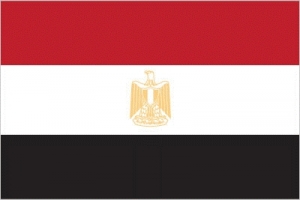Egypt
Official name of Egypt is Arab Republic of Egypt. Egypt is the gateway to Africa from the Middle East. It is bordered on the west by Libya and on the south by Sudan. On the east is the Red Sea and Israel. Egypt is divided by the Nile River, both sides being arid and hot. The Nile flows north from around 161 kilometers south of the Mediterranean and its tributaries empty into the sea between Alexandria and Port Said.
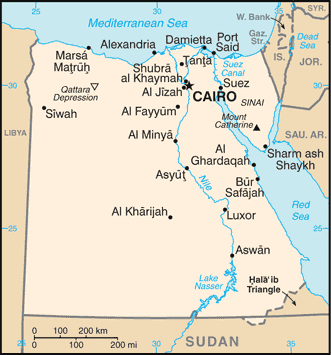
The terrain of Egypt is dominated by a vast desert plateau as well as the Nile valley and delta .The regularity and richness of the annual Nile River flood, coupled with semi-isolation provided by deserts to the east and west, allowed for the development of one of the world's great civilizations.
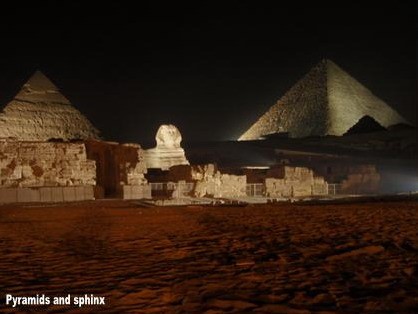
Climate is mostly desert with hot and dry summers and moderate winters. Egypt’s land boundaries are 2,689 kilometers while it has 2,450 kilometers of coastline. Area: 1,001,450 sq km, of which 995,450 sq km is land and 6,000 sq km is water. Population is about 80 million, of which 98% are Egyptian while the rest are comprised of Berber, Nubian, Bedouin, Beja, Greek, Armenian, Italian and French. Capital is Cairo. Other cities are Alexandria, Giza, Shubra el Khema and El Mahalla el Kubra. The official language is Arabic. English and French are also spoken.
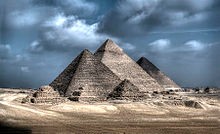
The Giza Necropolis is the oldest of the ancient Wonders and the only one still in existence
A unified kingdom arose circa 3200 B.C., and a series of dynasties ruled in Egypt for the next three millennia. The last native dynasty fell to the Persians in 341 B.C., who in turn were replaced by the Greeks, Romans, and Byzantines. It was the Arabs who introduced Islam and the Arabic language in the 7th century and who ruled for the next six centuries. A local military caste, the Mamluks took control about 1250 and continued to govern after the conquest of Egypt by the Ottoman Turks in 1517. Completion of the Suez Canal in 1869 elevated Egypt as an important world transportation hub. Ostensibly to protect its investments, Britain seized control of Egypt's government in 1882, but nominal allegiance to the Ottoman Empire continued until 1914. Partially independent from the UK in 1922, Egypt acquired full sovereignty from Britain in 1952. The completion of the Aswan High Dam in 1971 and the resultant Lake Nasser have altered the time-honored place of the Nile River in the agriculture and ecology of Egypt. A rapidly growing population (the largest in the Arab world), limited arable land, and dependence on the Nile all continue to overtax resources and stress society.
Islam came to Egypt in the seventh centuries with the arrival of the Arabs. According to the Constitution of 1971, the official state religion is Islam and the majority of Egypt's population are Muslims. Egypt is a predominantly Sunni Muslim country with Islam as its state religion. The percentage of adherents of various religions is a controversial topic in Egypt. An estimated 90% are identified as Muslim, 9% as Coptic Christians, and 1% as other Christian denominations.
After Islam arrived in the 7th century, Egypt emerged as a center of politics and culture in the Muslim world. Under Anwar Sadat, Islam became the official state religion and Sharia the main source of law. It is estimated that 15 million Egyptians follow Native Sufi orders, with the Sufi leadership asserting that the numbers are much greater as many Egyptian Sufis are not officially registered with a Sufi order. There is also a minority of Shi'a. The Jerusalem Center for Public Affairs estimates the Shia population at 1 to 2.2 million and could measure as much as 3 million. The Ahmadiyya population is estimated at less than 50 thousand. Whereas the Salafi (ultra-conservative) population is estimated at five to six million. Cairo is famous for its numerous mosque minarets and has been dubbed "The City of 1,000 Minarets".
Egypt recognizes only three religions: Islam, Christianity, and Judaism. Other faiths and minority Muslim sects practiced by Egyptians are not recognized by the state, and face persecution.
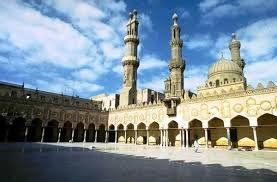
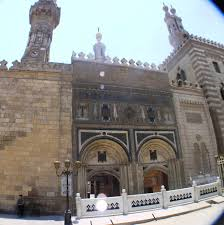
Al-Azhar University
There are two main Islamic institutions in Egypt, the oldest and the most important Islamic institutions represented in:
- Al-Azhar, which was built by the Fatimids to spread the Shiite sect in North Africa, before Salah El-Din converts it to Sunni University to become one of the main pillars of Sunni Islam in the world. And the current Sheikh of Al-Azhar is Eminance Sheikh Ahmed al-Tayeb.
- Dar el Eftaa was founded in 1895 and headed by the Grand Mufti of Egypt, Eminence Sheikh Ali Gomaa holds the post now.
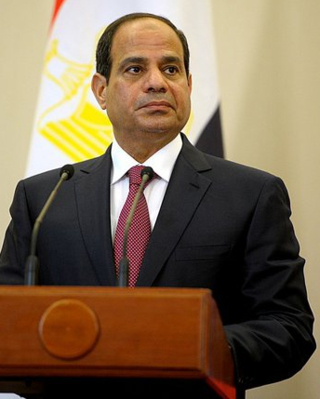
Abdel Fattah el-Sisi, current President of Egypt
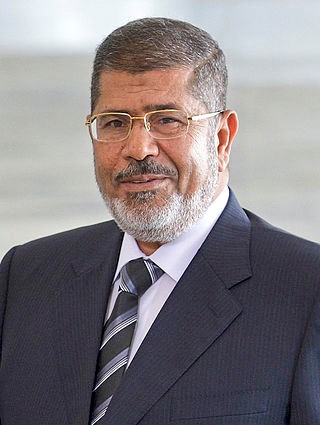
Mohamed Morsi
The government has struggled to meet the demands of Egypt's population through economic reform and massive investment in communications and physical infrastructure. Inspired by the 2010 Tunisian revolution, Egyptian opposition groups led demonstrations and labor strikes countrywide, culminating in President Hosni MUBARAK's ouster. Egypt's military assumed national leadership until a new parliament was in place in early 2012; later that same year, Mohammed MORSI won the presidential election. Following often violent protests throughout the spring of 2013 against MORSI's government and the Muslim Brotherhood (MB), and massive anti-government demonstrations, the Egyptian Armed Forces (EAF) intervened and removed MORSI from power in mid-July 2013 and replaced him with interim president Adly MANSOUR. On 18 January 2014, the interim government instituted a new constitution following a referendum in which 98.1% of voters were supportive. Participation was low with only 38.6% of registered voters participating although this was higher than the 33% who voted in a referendum during Morsi's tenure. On 26 March 2014 Abdel Fattah el-Sisi the head of the Egyptian Armed Forces, who at this time was in control of the country, resigned from the military, announcing he would stand as a candidate in the 2014 presidential election. The poll, held between 26 and 28 May 2014, resulted in a landslide victory for el-Sisi. Sisi sworn into office as President of Egypt on 8 June 2014. The Muslim Brotherhood and some liberal and secular activist groups boycotted the vote.

Cairo
Major exports are machinery and equipment, foodstuffs, chemicals and wood products. Natural resources are petroleum, natural gas, iron ore, phosphates, manganese, limestone, gypsum, talc, asbestos, lead and zinc. Agricultural products are cotton, rice, corn, wheat, beans, fruits, vegetables, cattle, water buffalo, sheep and goats. Major trading partners are Italy, United States, Syria, Germany, Spain, France, China, United Kingdom and Saudi Arabia.
Egypt's economy was highly centralized during the rule of former President Gamal Abdel NASSER but opened up considerably under former Presidents Anwar EL-SADAT and Mohamed Hosni MUBARAK. Cairo from 2004 to 2008 aggressively pursued economic reforms to attract foreign investment and facilitate growth. Poor living conditions combined with limited job opportunities for the average Egyptian contribute to public discontent. After unrest erupted in January 2011, the Egyptian Government backtracked on economic reforms, drastically increasing social spending to address public dissatisfaction, but political uncertainty at the same time caused economic growth to slow significantly, reducing the government's revenues. Tourism, manufacturing, and construction were among the hardest hit sectors of the Egyptian economy, pushing up unemployment levels, and economic growth remains slow amid political uncertainty, government transitions, unrest, and cycles of violence. Cairo since 2011 has drawn down foreign exchange reserves and depended on foreign assistance, particularly from Gulf countries, to finance imports and energy products and prevent further devaluation of the Egyptian pound, fearing higher inflation from a weaker currency.

